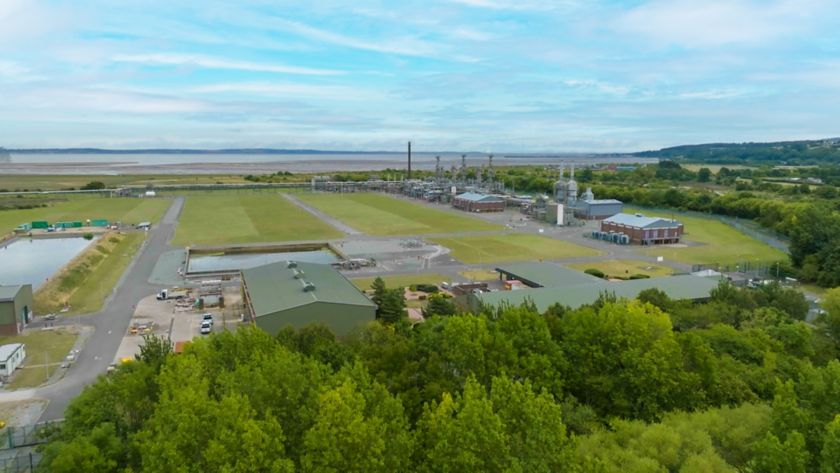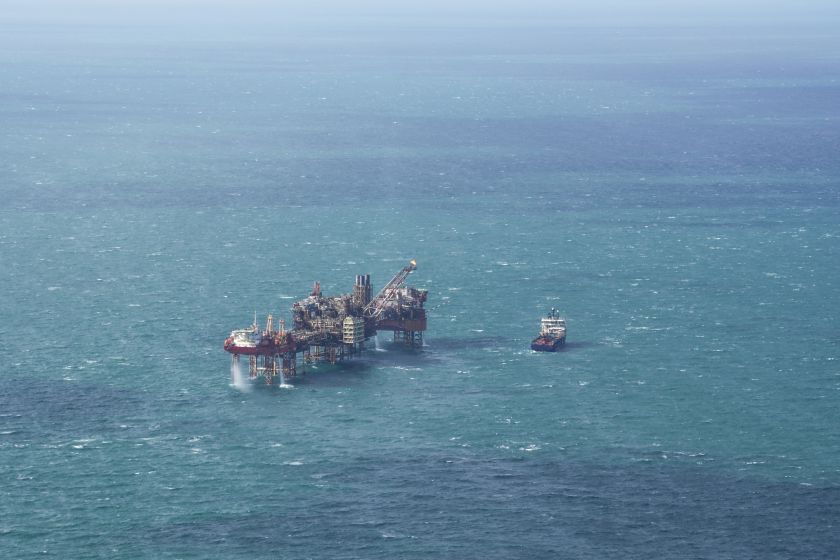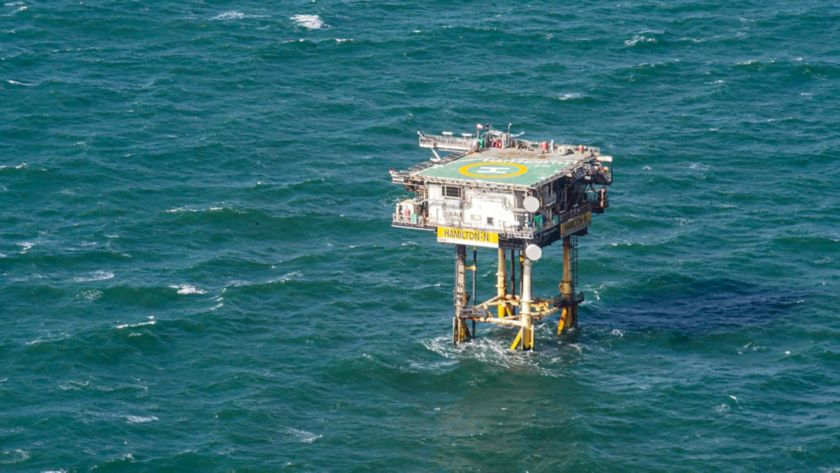Type of activity
Carbon management

Or , our new artificial intelligence tool.

The HyNet North West project will capture carbon dioxide produced by land-based industrial plants and store it permanently and safely in depleted gas fields in the Irish Sea. Thanks to Carbon Capture and Storage of CO2 (CCS), one of the UK’s most energy-intensive manufacturing districts will become one of the world's first low-emission industrial clusters.
As one of the UK’s leading industrial decarbonisation projects, we are paving the way for a low-carbon future by reducing carbon dioxide emissions from industry and fostering economic growth in the North West of England and North Wales region. Eni, via its Liverpool Bay CCS project, will provide the backbone for the transportation and storage of CO2 as part of the HyNet cluster. In addition, Eni has launched the Bacton Thames Net Zero initiative in the southern North Sea of the United Kingdom, which will develop a new CCS project to contribute to the decarbonization of the Bacton area and the Thames estuary, while potentially also attracting CO2 from the European Union.
Country: United Kingdom
Start date: 2020 - under development
Carbon dioxide emitted by industrial plants in the North West of England and North Wales will be captured and permanently stored in depleted hydrocarbon fields in the Irish Sea. In this way, thanks to Carbon Capture and Storage (CCS) technology, the HyNet North West project will transform one of the most energy-intensive districts in the UK into one of the world's first low greenhouse gas emission manufacturing districts. Specifically, Eni UK's depleted offshore fields Hamilton, Hamilton North and Lennox will be used.
The Liverpool Bay CO2 Transport and Storage (T&S) infrastructure will be pivotal for the UK’s journey towards a Net Zero future, by unlocking the decarbonisation of the HyNet cluster in North West of England and North Wales. Thanks to the project, CO2 will be captured from industrial emitters in the region and injected into new and repurposed gas pipelines. The first emitters connecting to Eni's T&S infrastructure include industries involved in cement manufacturing, low-carbon hydrogen production, and energy-from-waste. The remaining T&S capacity will be filled with additional emitters to be selected by the UK Authorities.




annual CO₂ storage potential from the second half of the current decade
annual CO₂ storage potential after 2030
in funding provided by the UK authorities 2024 over a 25-years to the first two UK’s CCS clusters
We work with hard-to-abate industries to unlock a low-carbon future for the region by transporting carbon dioxide from capture plants.
Visit the websiteThe main steps towards the completion of HyNet North West.
The allocation of funds marks a crucial step towards the start of the operational phase of the initiative.
The Development Consent Order (DCO) by the Secretary of State for the UK Government’s Department for Energy Security and Net Zero (DESNZ) will allow the transport of captured CO₂.
Agreement in principle reached on key terms and conditions relating to the economic, regulatory and governance model for CO₂ transport and storage in the HyNet North West CCS cluster.
The UK government selects the 5 capture projects that will supply CO2 to HyNet.
Eni UK announces that HyNet has been included as a CCUS project in Track 1 in the UK Government's tender process.
The NSTA North Sea Transition Authority (ex OGA) awarded the CO2 storage licence to Eni UK.

If you want to change topic, clear the chat and make a new query to receive more relevant results.
This will delete the question history.
If you want to change topic, clear the chat and make a new query to receive more relevant results. This will delete the question history.
Here you can find the full list of your queries.
The answers are generated by artificial intelligence, therefore they may contain inaccuracies. Please read the terms and conditions of use.

EnergIA is an innovative tool based on artificial intelligence capabilities, which can help you navigate the contents of eni.com, quickly finding answers to your questions. EnergIA can also perform a search on a specific topic, providing the most up-to-date data available, or it can invite you to delve deeper into a topic of your interest by suggesting links and specific readings. Start now!
EnergIA is an innovative tool based on artificial intelligence capabilities, which can help you navigate the contents of eni.com, quickly finding answers to your questions. Start now!
EnergIA (ener'dʒia) is a system based on Generative Artificial Intelligence.
Thanks to this technology, we can respond to your requests by querying the most relevant content and documents available on eni.com. (Note: financial documents from the last 12 months and press releases from the last 2 years are considered.)
Through EnergIA, you can delve into topics of interest and have a real-time window into the world of Eni.
If you wish to search for a specific document, press release or news, use the traditional search engine via the magnifying glass icon.
Like all systems that leverage Generative Artificial Intelligence, EnergIA may generate inaccurate or outdated responses. Always consult the sources that EnergIA proposes as the origin of the generated information.
If the system fails to find an exact match for the requested content, it still tends to provide a response.
If you find any inaccuracies in the provided response, please send us your feedback at the bottom of the page: it will be very helpful for us to improve.
Remember that the content generated by the system does not represent Eni’s official position. We therefore invite stakeholders to refer to their designated contacts for official statements: Press Office for journalists, Investor Relations for analysts and investors, Company Secretariat for shareholders etc..
EnergIA can understand questions posed in almost all languages, but we prefer to provide you with a response in English or Italian, the two languages available on eni.com. If you ask a question in Italian, the content on the site in Italian will be consulted. If you ask it in English or any other language, the content in English will be consulted. (Note: the language Eni uses for financial documents/content is predominantly English.)
If questions are formulated that violate the set security criteria, the system will not proceed with processing the response. Please remember not to send personal data.
By using this service, the users acknowledge that they have read and accepted the terms and conditions of use.
Search
EnergIA (ener'dʒia) is a system based on Generative Artificial Intelligence.
Thanks to this technology, we can respond to your requests by querying the most relevant content and documents available on eni.com. (Note: financial documents from the last 12 months and press releases from the last 2 years are considered.)
Through EnergIA, you can delve into topics of interest and have a real-time window into the world of Eni.
If you wish to search for a specific document, press release or news, use the traditional search engine via the magnifying glass icon.
Like all systems that leverage Generative Artificial Intelligence, EnergIA may generate inaccurate or outdated responses. Always consult the sources that EnergIA proposes as the origin of the generated information.
If the system fails to find an exact match for the requested content, it still tends to provide a response.
If you find any inaccuracies in the provided response, please send us your feedback at the bottom of the page: it will be very helpful for us to improve.
Remember that the content generated by the system does not represent Eni’s official position. We therefore invite stakeholders to refer to their designated contacts for official statements: Press Office for journalists, Investor Relations for analysts and investors, Company Secretariat for shareholders etc..
EnergIA can understand questions posed in almost all languages, but we prefer to provide you with a response in English or Italian, the two languages available on eni.com. If you ask a question in Italian, the content on the site in Italian will be consulted. If you ask it in English or any other language, the content in English will be consulted. (Note: the language Eni uses for financial documents/content is predominantly English.)
If questions are formulated that violate the set security criteria, the system will not proceed with processing the response. Please remember not to send personal data.
By using this service, the users acknowledge that they have read and accepted the terms and conditions of use.
A new window into Eni’s world, at your disposal. EnergIA is an innovative tool based on artificial intelligence capabilities, which can help you navigate the contents of eni.com, quickly finding answers to your questions.